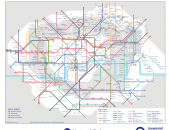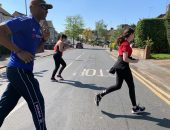A year and a half into the pandemic, regulations might be relaxing, but challenges and worries continue. Barnet-based John Bassett (psychodynamic counsellor), Anthea Sweet (soft tissue, sports injury and yoga specialist) and Dr Claudia Bernat (consultant psychiatrist) share some thoughts and observations.
A time to simplify and declutter unwanted habits
The last 18 months has seen us all sent on an emotional assault course of pain, stress and uncertainty. It stands to reason that finding some common way in dealing with the challenges of the pandemic would be virtually impossible. As a counsellor it is impossible to be prescriptive in how my clients and I deal with issues; what works for one may not be beneficial for another person, but hopefully there are some approaches that will strike a more common chord.
There is a similarity to the grieving process – we have all felt it. In the obvious form of loss of life, but also in the loss of a way of life. Everything has changed, perhaps irreversibly. For many, life, its old ways and meanings, are lost and cannot be the same again.
But crisis can be a start point of growth, an opportunity to re-evaluate our attitude and relationship with ourselves and others. We need to give ourselves the time to go through that – it will not happen overnight, but there are people for whom lockdown was a time to simplify and declutter unwanted habits. An internal audit, done subtly by some, while for others has been carried out almost militantly. Whatever works for the individual.
Simplification can come down to the most obvious and everyday – sleep, exercise, breaks from the endless news cycles, diet, keeping in touch with friends, work, alcohol – yet the importance of them and the attention we can pay to them can be a positive change that can be sustained as we emerge into a post-Covid world.
As with grief, we cannot bring back what was lost, but we can find a way to live with the loss. Simple adjustments in a post-Covid world does not mean easy ones, which is why my main tip is showing oneself and others compassion.
Take time, listen and give the benefit of the doubt, we are all going through this extraordinary time in myriad ways, but that compassion can be a light to guide ourselves through to more hopeful times.
John Bassett, Reg.MBACP, BPC.
John Bassett Counselling
Coping and compensating in different ways
As a yoga teacher and soft tissue therapist, I’ve seen the manifestations of the challenges of Covid from two angles.
Yoga classes switched to online overnight and whilst this was a technical mountain to climb for teachers and students alike, it soon became obvious that it was a lifeline to some, particularly those living alone or medically vulnerable. The routine was reassuring, something to frame the day or week around. Many wanted to chat before and after class, as a way of connecting. And we all felt we needed to keep our bodies going – it would have been so easy just to sit down and drink the wine. One student commented that lockdown felt like prison – the itchiness, both physical and mental, of wanting to get out but knowing that her best chance of coping and passing the time was to learn to relax more. Learning meditation was the route for some. All that said, we did sit down and drink the wine during our yoga and local knowledge Christmas quiz, a novelty for some, but for others one of several zoom quizzes that week!
As a hands-on therapist, it is clear to me that bodies have coped and compensated in different ways. Working at home, often in less-than-ideal conditions, has made bodies tighter and weaker, and being furloughed has been particularly unsettling for those with physical jobs. Exercise routines have been either being disrupted by the closure of the gyms or ramped up, both of which show physically in people already tested mentally and emotionally, the most common complaints being back/hip or shoulder/neck pain and repetitive strain injuries from too much keyboard work or suddenly taking up a new sport. Those who live alone and without a bubble have sometimes been simply grateful for the physical human touch. Long Covid looks to be a further challenge.
Anthea Sweet
Bodysense
Opportunities for change in a time of crisis
It is without doubt that the Covid pandemic has had a devastating effect on the nation’s mental health. A YouGov survey showed that only 48 percent of adults felt their mental health was fine. This, coupled with the fact that the number of NHS mental health beds has fallen by 25 percent in the last ten years, paints a very worrying picture.
All is not lost, however. The world has changed a lot over the last 18 months, and so has the way we see it. We have found new ways to work, new things to do, and new methods of tackling the bigger issues. These changes in our lifestyles, while initially shocking, have allowed us to review what we really want from life.
Firstly, working from home can now be seen as a new way to ease work-related stress and anxieties. By surrounding ourselves with the comfortable and familiar environment of our own homes and family members, both performance and quality of work can be increased without out the added pressures of an uninspiring office environment and a difficult daily commute. While it has sometimes caused an increase in stress, it has given us a new opportunity to connect with our loved ones while still satisfying our employers.
Another positive to have come out of the lockdown is the number of people who have taken up new hobbies. A poll conducted by The Independent found that a third of UK adults had found themselves a new hobby over the lockdown period. Going forward, these activities can be a useful tool in helping to regulate mental health – they keep the mind busy, provide an opportunity to achieve set goals, and often involve social interaction. Furthermore, hobbies that involve exercise or fresh air, such as cycling or gardening, can have benefits to one’s overall health and wellbeing.
The same can be said for the increase in pet ownership over the last 18 months. The Pet Food Manufacturer’s Association reported that 17 million households across the United Kingdom now own pets. Pets can provide companionship for those who are lonely and also allow people to get out of the house and exercise, especially in cases when extra motivation and structure is needed.
In conclusion, there is a chance to use what many of us have been through over the course of the Covid pandemic to help progress both the population’s mental and general health. These times have helped us to adapt to new challenges and to new styles of life. The capacity to adapt and modify have been exercised and now we can start to take steps away from lockdowns and towards the future.
Tom Gardner in collaboration with Dr Claudia Bernat
Ellesmere Clinic




